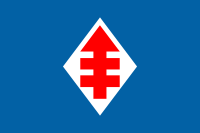Christian Democratic Party (Chile)
The Christian Democratic Party (Spanish: Partido Demócrata Cristiano, PDC) is a Christian democratic political party in Chile, led by Carolina Goic.
Christian Democratic Party Partido Demócrata Cristiano | |
|---|---|
 | |
| Leader | Carolina Goic |
| Secretary-General | Gonzalo Duarte |
| Chief of Deputies | Fuad Chahín |
| Chief of Senators | Andrés Zaldívar |
| Founded | 28 July 1957 |
| Merger of | Social Christian Conservative Party National Falange |
| Headquarters | Av. Libertador Bernardo O'Higgins 1460, Santiago de Chile |
| Student wing | Democracia Cristiana Universitaria |
| Youth wing | Juventud Demócrata Cristiana |
| Membership (2017) | |
| Ideology | Christian democracy[2][3][4] Conservatism[3][5] Social conservatism[5][6] Third Way[2][3][4] |
| Political position | Centre[7] to centre-left[4][8] |
| International affiliation | Centrist Democrat International |
| Regional affiliation | Christian Democrat Organization of America |
| Colours | Azure blue (customary) |
| Chamber of Deputies | 14 / 155 |
| Senate | 6 / 43 |
| Regional Boards | 44 / 278 |
| Mayors | 55 / 345 |
| Communal Councils | 388 / 2,224 |
| Party flag | |
 | |
| Website | |
| www | |
There have been three Christian Democrat presidents in the past, Eduardo Frei Ruiz-Tagle, Patricio Aylwin, and Eduardo Frei Montalva.
Customarily, the PDC backs specific initiatives in an effort to bridge socialism and laissez-faire capitalism. This economic system has been called "social capitalism" and is heavily influenced by Catholic social teaching or, more generally, Christian ethics. In addition to this objective, the PDC also supports a strong national government while remaining more conservative on social issues. However, after Pinochet's military regime ended the PDC embraced more classical economic policies compared to before the dictatorship. The current Secretary-General of the PDC is Gonzalo Duarte. In their latest "Ideological Congress", the Christian Democrats criticized Chile's current economic system and called for a shift toward a social market economy (economía social de mercado). The PDC often cooperated with centre-left parties until the collapse of the Nueva Mayoría coalition.
History
The origins of the party go back to the 1930s, when the Conservative Party became split between traditionalist and social-Christian sectors. In 1935, the social-Christians split from the Conservative Party to form the Falange Nacional (National Phalanx), a more socially oriented and centrist group.
The Falange Nacional showed their centrist policies by supporting leftist Juan Antonio Ríos (Radical Party of Chile) in the 1942 presidential elections but Conservative Eduardo Cruz-Coke in the 1946 elections. Despite the creation of the Falange Nacional, many social-Christians remained in the Conservative Party, which in 1949 split into the Social Christian Conservative Party and the Traditionalist Conservative Party. On July 28, 1957, primarily to back the presidential candidacy of Eduardo Frei Montalva, the Falange Nacional, Social Christian Conservative Party, and other like-minded groups joined to form the Christian Democratic Party. Frei lost the elections, but presented his candidacy again in 1964, this time also supported by the right-wing parties. That year, Frei triumphed with 56% of the vote. Despite right-wing backing for his candidacy, Frei declared his planned social revolution would not be hampered by this support.
In 1970, Radomiro Tomic, leader of the left-wing faction of the party, was nominated to the presidency, but lost to socialist Salvador Allende. The Christian Democrat vote was crucial in the Congressional confirmation of Allende's election, since he had received less than the necessary 50%. Although the Christian Democratic Party voted to confirm Allende's election, they declared themselves as part opposition because of Allende's economic policy. By 1973, Allende has lost the support of most Christian Democrats (except for Tomic's left-wing faction), some of whom even began calling for the military to step in. By the time of Pinochet's coup, most Christian Democrats applauded the military takeover, believing that the government would quickly be turned over to them by the military. Once it became clear that Pinochet had no intention of relinquishing power, the Christian Democrats went into opposition. During the 1981 plebiscite where Chilean voted to extend Pinochet's term for eight more years, Eduardo Frei Montalva led the only authorized opposition rally. When political parties were legalized again, the Christian Democratic Party, together with most left-wing parties, agreed to form the Coalition of Parties for the No, which opposed Pinochet's reelection on the 1988 plebiscite. This coalition later became Coalition of Parties for Democracy once Pinochet stepped down from power.
During the first years of the return to democracy, the Christian Democrats enjoyed wide popular support. Presidents Patricio Aylwin and Eduardo Frei Ruiz-Tagle were both from that party, and it was also the largest party in Congress. However, the Christian Democrat Andrés Zaldívar lost the Coalition of Parties for Democracy 1999 primaries to socialist Ricardo Lagos. In the parliamentary elections of 2005, the Christian Democrats lost eight seats in Congress, and the right-wing Independent Democratic Union became the largest party in the legislative body.
In recent years, the Christian Democrats have favored abortion in three cases (when a pregnancy threatens the mother's life, when the fetus has little chance of survival, and when the pregnancy is a result of rape), but not in any other instances, and opposes on-demand abortion.[9] Also, the Christian Democrats oppose same-sex marriage.
The Christian Democrats left the Nueva Mayoría coalition on 29 April 2017 and nominated current party president Carolina Goic as their candidate for the 2017 presidential election. The Nueva Mayoria has struggled to remain united as differences have opened up within the coalition over approaches to a government reform drive, including changes to the labor code and attempted reform of Chile’s strict abortion laws.[10]
Presidents elected under Christian Democratic Party
- 1964 - Eduardo Frei Montalva
- 1990 - Patricio Aylwin
- 1994 - Eduardo Frei Ruiz-Tagle
Presidential candidates
The following is a list of the presidential candidates supported by the Christian Democratic Party. (Information gathered from the Archive of Chilean Elections).
- 1958: Eduardo Frei Montalva (lost)
- 1964: Eduardo Frei Montalva (won)
- 1970: Radomiro Tomic (lost)
- 1988 plebiscite: "No" (won)
- 1989: Patricio Aylwin (won)
- 1993: Eduardo Frei Ruiz-Tagle (won)
- 1999: Ricardo Lagos (won)
- 2005: Michelle Bachelet (won)
- 2009: Eduardo Frei Ruiz-Tagle (lost)
- 2013: Michelle Bachelet (won)
- 2017: Carolina Goic (lost)
Election results
| Election | Leader | Votes | % | Seats | +/- | Coalition | President |
|---|---|---|---|---|---|---|---|
| 1961 | Narciso Irueta | 213,468 | 15.93% | 23 / 147 (16%) |
N/A | Jorge Alessandri (Ind.) | |
| 1965 | Renán Fuentealba | 995,187 | 43.60% | 82 / 147 (56%) |
+59 | Eduardo Frei (PDC) | |
| 1969 | Rafael Agustín Gumucio | 716,547 | 31.05% | 55 / 150 (37%) |
-27 | Eduardo Frei Montalva (PDC) | |
| 1973 | Renán Fuentealba | 1,055,120 | 29.07% | 50 / 150 (33%) |
-5 | Confederation of Democracy | Salvador Allende (PS) |
| Congress Suspended (1973-1989) | |||||||
| 1989 | Andrés Zaldívar | 1,766,347 | 25.99% | 38 / 120 (32%) |
N/A | Concertación | Patricio Aylwin (PDC) |
| 1993 | Gutenberg Martínez | 1,827,373 | 27.12% | 37 / 120 (31%) |
-1 | Eduardo Frei Ruiz-Tagle (PDC) | |
| 1997 | Enrique Krauss | 1,331,745 | 22.98% | 38 / 120 (32%) |
+1 | Eduardo Frei Ruiz-Tagle (PDC) | |
| 2001 | Patricio Aylwin | 1,162,210 | 18.92% | 23 / 120 (19%) |
-15 | Ricardo Lagos (PPD) | |
| 2005 | Adolfo Zaldívar | 1,354,631 | 20.78% | 20 / 120 (17%) |
-3 | Michelle Bachelet (PS) | |
| 2009 | Juan Carlos Latorre | 931,789 | 14.24% | 19 / 120 (16%) |
-1 | Sebastián Piñera (RN) | |
| 2013 | Ignacio Walker | 965,364 | 15.56% | 22 / 120 (18%) |
+3 | New Majority | Michelle Bachelet (PS) |
| 2017 | Carolina Goic | 616,550 | 10.28% | 14 / 155 (9%) |
-8 | Democratic Convergence | Sebastian Piñera (Ind.) |
References
- Pablo Garrido González (December 2012). "Revolución en Libertad, Concepto y programa político de la Democracia cristiana chilena" (PDF). Programa de Historia de Las Ideas Políticas en Chile. Archived from the original (PDF) on 2015-06-20. Retrieved 2015-06-20.
- Héctor Gómez Peralta (2012). "Precisiones conceptuales sobre la democracia cristiana y el neo-liberalismo".
- Ignacio Walker; Andrés Jouannet (2006). Democracia Cristiana y Concertación: los casos de Chile, Italia y Alemania (PDF). Scielo. Archived from the original (PDF) on 2016-03-07. Retrieved 2015-06-20.
- Sol Serrano (2005). "Conservadurismo y Democracia Cristiana" (PDF). Centro de Estudios Miguel Enríquez. Retrieved 19 June 2015.
- Bárbara Sifón (29 July 2014). "Hugo Herrera, académico UDP: "La derecha hace guerrilla política, pero no tiene discurso"". Archived from the original on 17 June 2015.
-
- Boyd, Sebastian (15 December 2017). "How Chile's Shifting Politics Baffled Markets". Bloomberg. Retrieved 22 October 2019.
- Slattery, Gram (11 March 2017). "Chile Christian Democrats pick senator for crowded presidential race". Reuters. Retrieved 22 October 2019.
- "It's the Christian Democrats' Fault: Declining Political Identification in Chile, 1957–2012". Research Gate. Canadian Journal of Political Science. January 2016. Retrieved 22 October 2019.
- "CIA Paid Chilean Pols". CBS News. 13 November 2000. Retrieved 22 October 2019.
- Eduardo Frei (October 26, 2014). "Eduardo Frei: "Conozco a la DC y no es un partido de derecha sino que de centroizquierda"". El Día. Archived from the original on October 26, 2014.
- http://www.latercera.com/noticia/carolina-goic-aborto-no-tema-evaluar-voto-la-calculadora/
- Chile's governing coalition splits ahead of November election Reuters April 30, 2017
Further reading
- Luna, Juan Pablo; Monestier, Felipe; Rosenblatt, Fernando (2014). Religious parties in Chile: The Christian Democratic Party and the Independent Democratic Union. Religiously Oriented Parties and Democratization. Routledge. pp. 119–137.
External links
![]()